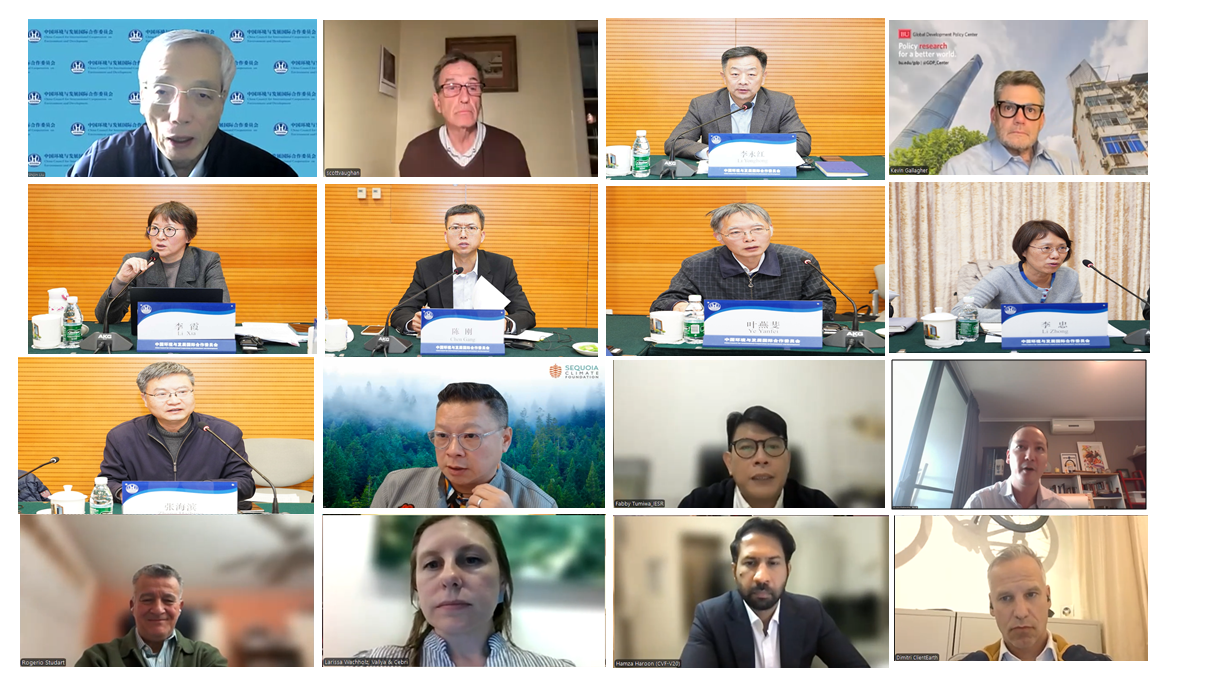
The kick-off Meeting for the China Council for International Cooperation on Environment and Development (CCICED) Special Policy Study (SPS) on Green Development Cooperation was held in Beijing on March 5th, 2025. This SPS is co-led by Li Yonghong, Director General of Foreign Environmental Cooperation Center (FECO), MEE on the Chinese side, and Christie Ulman, CCICED Member on the international side. Chinese and International Chief Advisors of CCICED joined the meeting virtually. Liu Shijin, CCICED Chinese Chief Advisor gave opening remarks, and Scott Vaughan, CCICED International Chief Advisor, made closing remarks. The meeting was moderated by the Chinese Deputy Co-lead Zhang Jianyu, Chief Development Officer of BRI International Green Development Coalition (BRIGC).

Liu Shijin emphasized that despite short-term challenges in global environmental and climate governance, the trend of green transition remains irreversible. The synergistic effects between green development and high-quality economic growth are becoming increasingly prominent. To advance international cooperation on green development, it is crucial to adopt an open approach to break through geopolitical barriers, accelerate the sharing of concepts and technologies, and build inclusive multilateral platforms to support developing nations in their low-carbon transitions. He expressed expectations that the SPS would prioritize theoretical breakthroughs, innovative policy frameworks, and pioneering case studies, with a focus on generating high-quality, inspiring outcomes that provide new models and pathways for deepening global green cooperation.
Li Yonghong and Kevin Gallagher, International Deputy Co-lead and Director of Global Development Policy Center of Boston University, introduced the background, objectives, research framework, progress and work plan of the SPS. Based on the new landscape, opportunities and challenges of the global cooperation in environment and development, the study will review the history of North-South and South-South cooperation in environment and development, and explore innovative models for green development cooperation in the new era through identifying key areas and summarizing regional practices, and eventually propose policy recommendations for the development of a mid and long-term plan for green development cooperation. CCICED Secretariat attended the meeting and introduced the SPS Work Plan for 2024-2025.
Scott Vaughan underscored in his concluding remarks that the climate crisis presents transformative opportunities requiring deepened global collaboration in climate action, technology sharing, and just transition. He suggested that the SPS team should build upon CCICED research outcomes to develop actionable policy recommendations for innovating green development cooperation frameworks. He advocated for showcasing China's practical solutions in green finance and energy transition at global platforms including COP30 and the UN International Conference on Financing for Development. These deliverables, he noted, should crystallize China's operational experience into replicable models to advance equitable climate governance worldwide.
Chinese and international experts conducted in-depth discussion during the meeting, including Ye Yanfei, CCICED Special Advisor, Counsel (DG Level) of Policy Research Bureau of China Banking and Insurance Regulatory Commission (CBIRC); Li Zhong, Deputy Director General of Energy Research Institute of National Development and Reform Commission (NDRC); Chen Gang, Head of BRIGC; Li Xia, Deputy Director General of FECO; Zhang Haibin, Vice Dean of School of International Relations at Peking University; Sze Ping Lo, CCICED Special Advisor; Fabby Tumiwa, Executive Director of the Institute for Essential Services Reform; and Leo Horn-Phathanothai, President of Sustainability and Innovation Strategy 613 Company. They shared views on climate change response, energy transition, biodiversity conservation, green trade, green technology, green finance and other key issues.
The discussions provided new insights for promoting innovative models of green development cooperation from the perspective of bilateral, multilateral, and regional cooperation mechanisms as well as collaboration model between governments, think tanks and businesses. Experts also proposed valuable suggestions for the future work of the SPS research team. Approximately 50 project team members, experts, and CCICED partners participated in the meeting both online and offline.
Copyright © 2020 BRI International Green Development Coalition. All rights reserved.
Address: No.5 Houyingfang Hutong, Xicheng District, Beijing 100035, China
Postcode: 100035
Fax: (86)10-82200539
E-mail: secretariat@brigc.net